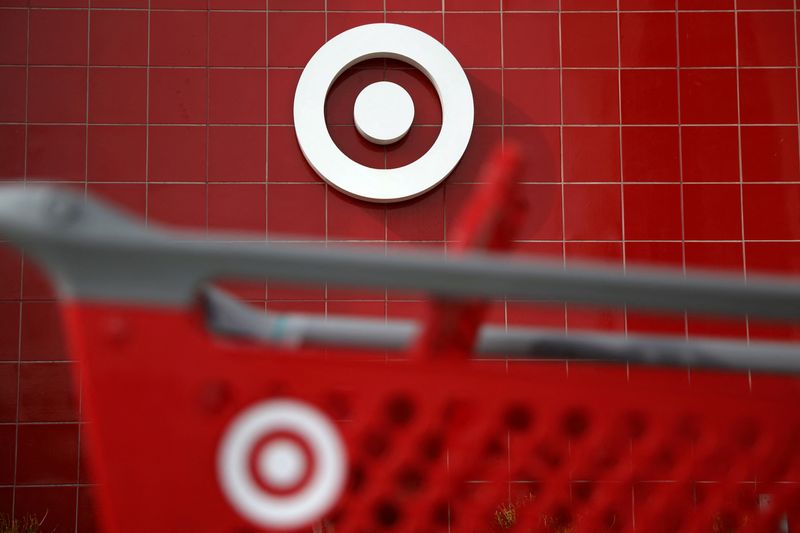By Siddharth Cavale
NEW YORK (Reuters) -In the most competitive holiday season in years, major U.S. retailers Target (NYSE:TGT) and Walmart (NYSE:WMT) are spending more on ads to reach shoppers on short-video app TikTok and streaming platforms.
But while recent U.S. credit- and debit-card data point to a small gain for Target, with its shoppers spending slightly more in early December than a year ago, there's little that the Minneapolis-based chain can do this year to reverse the trends that have put it at a disadvantage, investors told Reuters.
With more than 1,950 stores across the United States, and an array of mostly non-essential merchandise, Target has lost market share following waning sales. Target's shares have fallen 7% this year, compared to Walmart's 72% gain.
"Target's funk has been in place for a couple of years now and doesn't have a quick fix," said Charles Sizemore, chief investment officer of Sizemore Capital Management, which owns $220,000 in Target shares.
"Would a late surge in advertising encourage shoppers to spend their gift cards at Target before year end? Maybe," Sizemore said. "I wouldn't necessarily bet on that."
Many retailers have kept a tight lid on spending as shoppers cut back on non-essential purchases. D.A. Davidson analysts expect Target's net advertising spending to rise only 0.11% overall in 2024.
"The fourth quarter is our biggest sales season of the year, and our marketing spend reflects that," a Target spokesperson said, declining further comment.
From October through mid-December, Target spent 8% more on online advertising, compared to the same period a year earlier, including 70% more on TikTok to reach younger spenders, according to data from market intelligence firm Sensor Tower, which tracks online ad spending. But Walmart boosted its online advertising outlays by 30% during the same period, with a 200% increase in spending on TikTok.
Target's modest bump in advertising started in October when it began pitching its Circle Week deals, a week later than last year, Kara Lee, brand and digital advertising analyst at Sensor Tower, said.
In late November, Target forecast holiday-quarter comparable sales and profit below estimates as value-conscious consumers shopped for low-priced essentials at rival retailers including Walmart. Target's subsequent sales on Black Friday and Cyber Monday weren't particularly strong, according to third-party data measuring credit- and debit-card spending trends.
In the two weeks after Cyber Weekend, the shopping period from Thanksgiving through Cyber Monday, however, Target stepped up its digital advertising, spending 12% more compared to the two weeks leading up to Thanksgiving, and bought more spots on streaming platforms like Peacock and Hulu, Sensor Tower data shows.
Target's last-minute marketing push draws attention to its bargains, urging shoppers to "Hurry! Before last-minute deals are over," as one Target ad puts it. The retailer offered up to 50% discounts on toys and video games and up to 40% off kitchen appliances. Walmart, which operates 4,615 U.S. stores, focused its digital ad spending earlier in the season to tout its Walmart+ membership program as a way to tempt shoppers hunting for Black Friday deals.
Yet shoppers only modestly boosted their spending at Target in early December, according to credit- and debit-card data from two separate research firms. And in the week following Cyber Monday week, visits were down 6.8%, according to foot traffic data from Placer.ai.
From Black Friday on Nov. 29 to Dec. 11, for instance, Target shoppers spent 5.5% more compared to the same 13-day period last year, according to Earnest Analytics, which tracks final amounts on credit- and debit-card receipts without adjusting for inflation. A separate data firm, Facteus, said Target shoppers spent just 2.2% more during the period compared to a year earlier. Facteus says it captures between 7% and 10% of U.S. spending on credit and debit cards.

The investors said Target has a longer-term goal, one that will require it to shift its strategy over several quarters. Given the price-sensitivity of many Americans, Target still needs to lower its prices to better compete with Walmart and Costco (NASDAQ:COST), Bernstein analysts said last week.
"Management's imperative is to win back the moms" who typically are its core customers, said Bill Smead, chairman of Smead Capital, whose firm owns about 1.3 million Target shares.